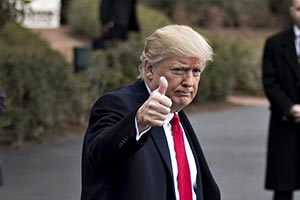Trump May Need a Second Term to See Fruits of His Trade Deals

So far, President Trump has mostly declared policy 140 characters at a time, or through flurries of executive orders. But history shows that trade deals, a major priority for the new administration, are the opposite of quick tweets: a painstakingly slow process.
Even when negotiating with the smallest countries, in some cases it's taken the United States the best part of a presidential term to get the paperwork done, and more than two terms before the deal goes into effect.
RELATED: Trump revamps US trade focus by pulling out of Pacific deal
On average, trade deals take more than three and a half years to implement, according to research by Caroline Freund and Christine McDaniel published by the Peterson Institute for International Economics.
On that schedule, any new trade pact wouldn't take effect before the November 2020 presidential election, even if Trump announced the start of talks today. Which he can't do anyway, because key personnel — Commerce Secretary in waiting Wilbur Ross, Treasury Secretary nominee Steven Mnuchin and chief trade negotiator Robert Lighthizer — haven't yet been confirmed by the Senate.
A lifelong dealmaker, Trump will find this kind of negotiation is a morass of regulatory, political and diplomatic sticking points. When it comes to opening up trade, every country poses a unique challenge.
RELATED: Trump Nafta revamp may hinge on partners’ readiness to talk
Popcorn, for example, is about as American as it gets, but Kenya has its own ideas on the subject. It requires imports to meet a moisture level that's about half the U.S. equivalent. In Paraguay, American beef imports have been banned since 2003 because of concerns over mad cow disease.
Sometimes, deals can get done quickly. A pact with Jordan, which took 18 months from launch to implementation, was the fastest in Freund and McDaniels' data set. They surveyed 20 U.S. trade agreements, most of them in the post-Cold War period when such accords became a policy tool of choice.
Still, some of the deals Trump is touting, like the proposed one with the U.K., would present challenges that Jordan did not.
For a start, Britain is in the process of leaving the European Union. That will take until at least 2019 under the current timetable, and under EU law no trade negotiations can take place until that process is done. And then the real arguing will start. Will restrictions be relaxed on the trade of genetically modified crops? Will it allow American health care companies to compete against its state-run National Health Service?
"Probably 20% of the agreement takes up 80% of the time," Freund said.
Renegotiating Nafta will be contentious, too, though it may avoid some of the roadblocks found in new agreements, because Trump has an existing trade agreement on which to base discussion.
Trump does have one advantage in speeding up the process — he's committed to bilateral deals, as opposed to the multilateral ones pushed by his predecessor Barack Obama. Two-country accords take less time to put in place, according to Andrew Rose, a professor at the University of California, Berkeley Haas School of Business.
Another tip for Trump emerges from Freund and McDaniel's research: Make deals with monarchs. Three of the four quickest agreements in their survey were with countries ruled by kings who had the power to slash through red tape.
Unfortunately for the president, that only applies to absolute monarchies. The U.K.'s Queen Elizabeth II probably isn't planning to hammer out the details of poultry tariffs in person.

